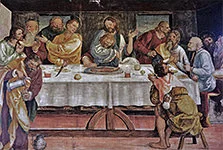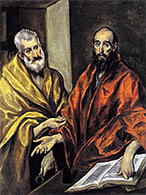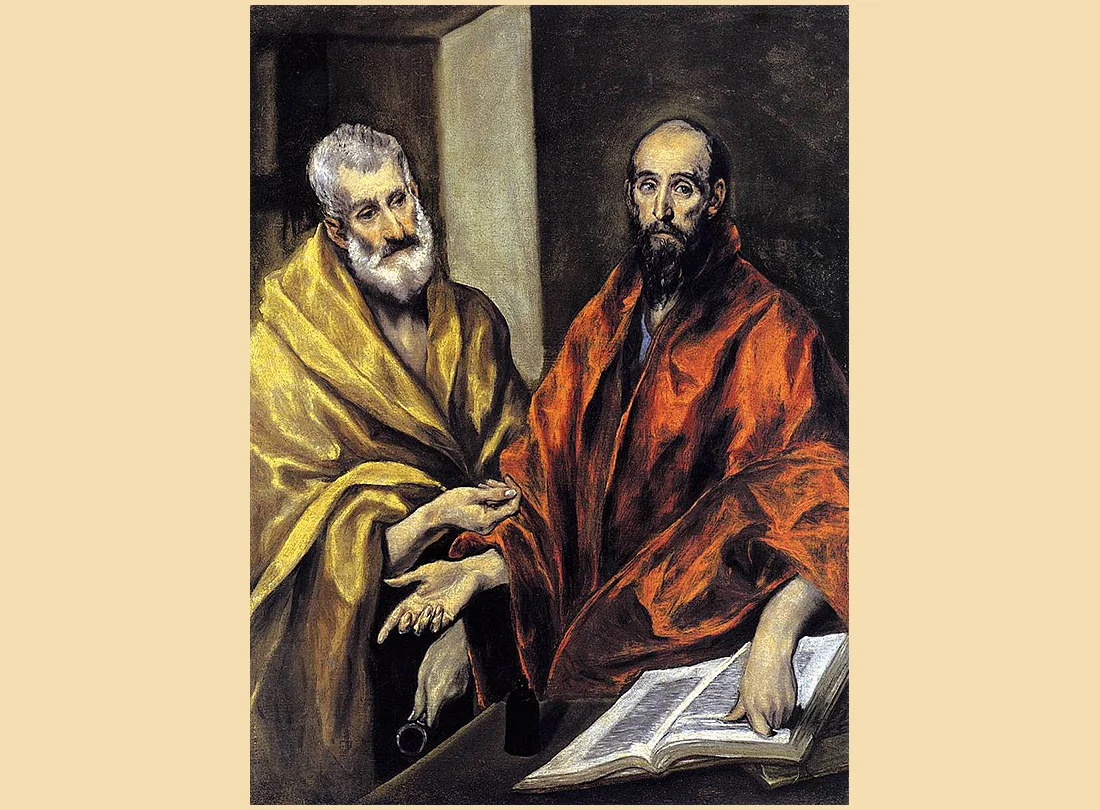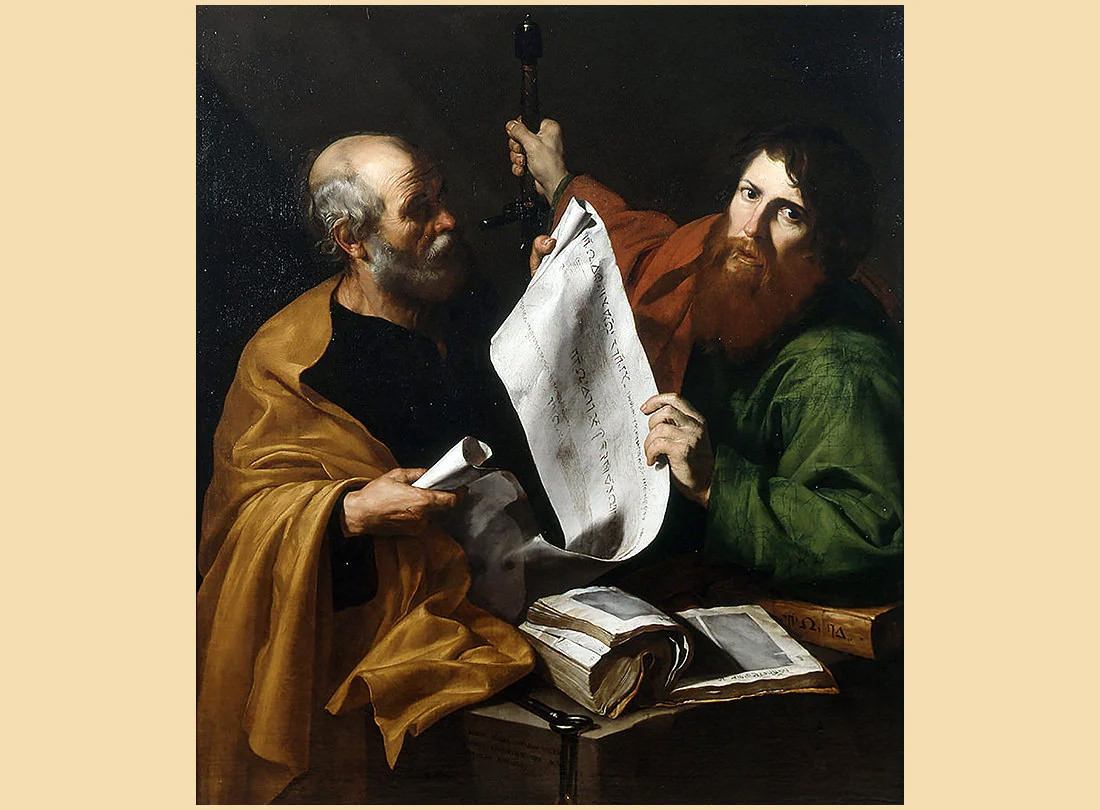
by Warren Camp
2 Peter 3:14–16 . . .
“Peter’s Closing Exhortation”
Peter was a concerned apostle who wanted his readers to persevere. In today’s three-verse passage, he again addresses them as “dear friends” (3:1, 8, 14, 17) while ending this second letter with his call to persevere diligently. He’s already refuted the errors of false teachers who scoffed at the belief that Christ will return to judge the earth. They were leading a number of believers astray by attracting them with their self-satisfying message of sensuality and greed. Peter didn’t want his flock to be seduced by the error of these unprincipled men and eventually fall from being steadfast (3:17). A distinguishing mark of a true Christian is making the Bible the authority for living. False teachers always deviate from the truth of Scripture, but the elect of God make the Bible their only rule of faith, instruction, and practice.
Having already encouraged his friends to persevere (3:1–2, as highlighted in Warren’s commentary on 3:1–2), in vv. 14–16, Peter encourages them yet again to use spiritual discernment to protect themselves from being deceived by false teachings. [See Dr. Charles Stanley’s “The Protective Power of Discernment” advisory at the bottom of this commentary.]
In Apostle Peter’s opinion, utilizing spiritual discernment will enable his readers (including every believer today) to become and remain diligent at persevering toward that glorious day of Christ’s return. To persevere, we need to make God’s focus our focus! Father God is delaying Christ’s return because he’s patiently waiting for the lost to choose to be saved. So, diligent perseverance rests on maintaining a hope for his coming, a holiness that yields a clear conscience; and a heart for the lost.
Be Diligent at Being Free of Blemishes (3:14)
Peter emphasizes again his point from vv. 11–12, namely that believers should be persistent, so as to grow spiritually with discernment and serve God while awaiting Christ’s return. Peter makes it absolutely clear that only holiness and righteousness will survive in this world; his admonition to be diligent at securing salvation served to warn Christians then, and today, to strive toward adopting eternal values, since everything else will eventually fail.
14So then, dear friends, since you are looking forward to this, make every effort to be found spotless, blameless and at peace with him (2 Pet. 3:14 NIV).
We should note that Peter repeats the verbs “look forward” and “wait eagerly” in vv. 12, 13, and 14. Both terms relate to eagerly expecting Jesus’ promised coming with new heavens and new earth, “where righteousness dwells.” Peter assumes that his readers are already looking for these promises to be fulfilled, but he wants them to persevere in this hope. He then orders his readers to “make every effort” or “be diligent,” which implies giving attention to something, exerting ourselves toward a goal. The aim of our diligent effort is, “to be found spotless, blameless, and at peace with him,” that is, to maintain a holy or godly behavior, which is required for us to have a clear conscience. Such inner peace allows one to feel a sense of well-being that comes from a deep relationship with God. It’s the kind of wholeness that comes from having the image of God — previously shattered by sin — fully restored for believers.
Interestingly, when speaking to his dear friends about redemption in v. 14, Peter’s pair of epithets, “spotless” and “blameless,” coincide with his earlier description in 1 Peter 1:19 of two of the Lord’s quality characteristics. Therein, he makes clear that believers will be redeemed, not with the false teachers’ perishable things of gold and silver but with the precious blood of Christ who is a lamb “without blemish or defect.” We’re to be like Jesus!
Regarding Peter’s follow-up directive to “make every effort to be…at peace with him,” if our hearts are firmly set on the glory of the new heaven and new earth, we’ll endeavor to walk godly in regard to our brothers and sisters — in peace — and in regard to God — without spot and blame. Doing so allows believers to confidently rest assured that they have peace with God as a result of being justified by faith (Romans 5:1). However, it’s always possible that believers will displease the Lord if they fail to live as he desires and directs. As a result, they might not receive his personal commendation and reward when he returns (1 Corinthians 3:10–15; 2 Cor. 5:10).
Starting in v. 15, Peter says only a few words about Paul, but don’t take them lightly. We could easily read through his comments without giving them adequate notice, thereby overlooking much. We’ll see that Paul profoundly influenced not only Peter but the rest of the apostles, and that his ministry played a major role in defining and declaring the gospel from New Testament days until now.
Peter Endorses Paul’s Writings (vv. 15–16)
In 3:9 (as highlighted in Warren’s commentary on 3:8–9), we initially saw the connection between God’s patience and our salvation. Peter told his readers that God is patient with the whole world, giving adequate time for everyone to keep themselves from perishing by repenting and turning to him. Here in v. 15, Peter reminds us that, because of our Lord being quite patient with us as individuals, we can count on receiving his gift of salvation.
15Bear in mind that our Lord’s patience means salvation, just as our dear brother Paul also wrote you with the wisdom that God gave him. 16He writes the same way in all his letters, speaking in them of these matters. His letters contain some things that are hard to understand, which ignorant and unstable people distort, as they do the other Scriptures, to their own destruction (2 Pet. 3:15–16).
Look closely at the Greek wording Peter used in v. 15a’s “our Lord’s patience means salvation.” The word “patience” (a favorite word found in Paul’s epistles) is the Greek word hupomeno — a compound of the words hupo and meno. The word hupo means under, underneath something, while meno means to stay, to abide. It’s the state of mind that says, This is my spot; I’m not moving! Thus, hupomeno conveys the idea of being steadfast, consistent, unwavering, and unflinching. Herein, Peter assures us that our Lord has hang-in-there power, staying power, or simply an unlearned supernatural endurance. What an incredible, divine endowment God alone has.
And, the Greek that Peter used for “salvation” in v. 15a’s “our Lord’s patience means salvation” is soteria. It comes from the root verb sōzō, which means to save, to deliver, to protect, to heal, to make whole. In the New Testament, soteria is often used to refer to spiritual salvation through faith in Jesus Christ. This Greek word depicts a person who paid a very high price to obtain ultimate freedom. Peter, here, uses soteria to note the redemptive work of Jesus Christ in our behalf. The history of the world, between the first and second coming of Christ, is the age of salvation. The Savior has come and freely opened to all a direct way to God.
In vv. 15 and 16, Peter introduces us, almost surprisingly, to Apostle Paul, who was a leader, in Peter’s opinion, filled with God-given wisdom. When he refers to him as “our dear brother Paul,” Peter expresses genuine warmth; there’s no jealousy or competition, even though Paul once rebuked Peter for his legalistic outlook over table fellowship with the non-Jewish Gentiles. Here, he confirms the unity of teaching and purpose that governed their relationship, which is abundantly attested to in Peter’s two epistles and the book of Acts. As Peter has been addressing apostate false teachers, his words urge us to regard Paul as more than a mere teacher; he was an apostle chosen by our Lord; “all his letters” are the inspired Word of God. Both men are in agreement in what they’ve written on many matters. Paul was the perfect counterpart to Peter and the other apostles. When Peter says of Paul, that “he writes the same way in all his letters,” Peter may be referring in general to exhortations for holy living in vv. 11–14, which parallel many passages in Paul’s writing. When he says, “His letters contain some things that are hard to understand,” it can be comforting to note that Peter found only some of Paul’s writings uneasy to comprehend. Perhaps Peter was referring to Paul’s viewpoints on the Christ’s second coming and the events surrounding it.
The smartest leaders in the world are those who realize their gifts and their limitations. Wise leaders recognize the need for gifted, talented, willing-minded people to join the team and effectively help do what’s needed. Paul had formerly been a lawyer, politician, and Pharisee. As a result, he was probably wealthy and also able to claim that he’d seen Jesus and been taught by him (Galatians 1:12). Regarding his being an apostle, he acknowledged that his apostleship to the Gentiles was “at work in me” (2:8), allowing previously appointed apostles to see the extent of grace that God had given him. Here in 2 Pet. 3:16a, Peter writes that the profound nature of Paul’s revelation of hard-to-understand concepts was so extraordinary that even he wrestled to comprehend it all. The “ignorant and unstable people” referenced in v. 16b, are presumably the unlearned who’ve not been taught basic apostolic teaching. Thus, they may be easily led astray (2:14). Untaught and unstable professing Christians, unable to fully trust the gospel message, will distort (twist, torture) biblical teachings to make them fit their preferred evil schemes. It’s noteworthy to see that Peter, when he writes, “the other Scriptures,” placed Paul’s writings on the same level of authority as the God-breathed writings of Old Testament Scriptures.
Finally, Peter’s message to us is this: God’s day of judgment is coming. Such a fact should stimulate us to persevere diligently, maintaining the hope of his coming and the holiness needed for a clear conscience while developing a heart for the lost. We can succeed at all that when we read, understand, and discern the purpose and meaning of Scripture.
“The Protective Power of Discernment” by Dr. Charles Stanley
Spiritual discernment protects us from deception. Sin is always dressed up to look tempting and appealing; if we think what looks good and feels right must be OK, then we’re in danger of being mislead by the enemy. When Satan tempts us, he never mentions consequences or negative impact.
Spiritual discernment is our God-given capacity to judge what’s right and wrong. It protects us from the suffering that accompanies disobedience. We need a clear connection to the Holy Spirit to have peace and assurance that we’re doing the right thing and aligned with God’s will.
Sometimes an opportunity appears harmless or, in many cases, very appealing. But if the Holy Spirit within us sends a signal to not pursue it, then we dare not; for some reason, God doesn’t want us in that situation. Though we can certainly speculate, we may never know what danger(s) we avoided by being obedient. Sin doesn’t initially appear as the ugly, deceitful disobedience it is. Instead, it presents itself as a wrapped attractive-looking package that’s hard to resist. God’s children can see past the glitter and false beauty, so long as they choose to look. Our spiritual wisdom comes only from a clean heart and discerning spirit. An astute believer is one who makes prayer, repentance, and biblical training a regular part of his or her routine.
- Q. 1 While you wait for Jesus to return, how are you making yourself ready (v. 14)?
- Q. 2 How is God’s patience a benefit to you?
- Q. 3 How does Peter’s reference to Paul encourage his readers to behave appropriately?

‘The Last Supper’ by Da Milano
Click to open “Peter Masterpieces.”
Summary Video: “Second Peter”
† Watch this overview video of Second Peter created by BibleProject.
Warren’s New “Peter Masterpieces” Photo Album
† View several classic paintings of Saint Peter by art world masters: Rembrandt, Michelangelo, Da Vinci, Rubens, Goya, El Greco, Raphael, Masaccio, Giotto, Correggio, Tintoretto, Caravaggio, Veneziano, Tissot, Duccio, Fra Angelico, Galle, Dürer, Palomino, and many more.
2 Peter 3:14–16
New International Version (NIV) or view it in a different version by clicking here.
— Listen to chapter 3, narrated by Max McLean.







